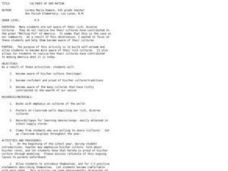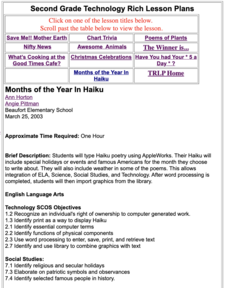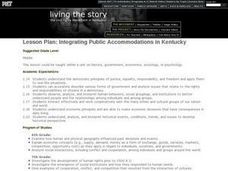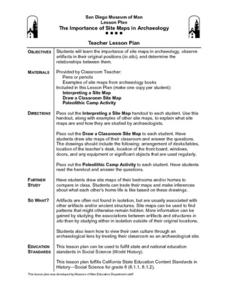Curated OER
Classroom Guide for Coming to America
Students discuss the pre-reading focus questions. In this reading lesson, students discuss and explore the book cover and title. Students predict what they will learn from this book. Additionally, students read to find out what life is...
Curated OER
How Powerful is Static Electricity
Young scholars explore energy by participating in controlled electricity experiment. For this static electricity lesson, students identify the different sources that can create energy and how static electricity can be created very easily...
Curated OER
Kente Straw Weavings
Fourth graders explore world culture by creating an arts and crafts project in class. In this weaving lesson, 4th graders identify the Kente culture and their uses for straw and other natural elements in their communities. Students...
Curated OER
Integration, the Skill that Binds
Tenth graders use mathematical concepts to help clarify their beliefs, effect solutions, and improve verbal skills. They use the steps common to the scientific methods as an aid in development of cognitive skills.
Curated OER
Links to the Missing
Students investigate the information required to identified missing persons, then create a personal 'database' of information on themselves and their community.
Curated OER
World War II Review
Ninth graders review previously presented material on World War II and discover how the world was at that time. They, in groups, participate in map work designed to explain Axis and Allied countries using toy army men.
Curated OER
Tracking Local Weather
In this activity, studens will use different types of weather gauges and track the local weather for a week. After the week is over, students will collect their samples, analyze the data, and compare their conclusions to local weather...
Curated OER
Let's Read! Eating the Alphabet: Fruits and Vegetables from A to Z.
Students listen to the story Eating the Alphabet: Fruits and Vegetables from A to Z by Lois Ehlert, and try at least one new fruit or vegetable.
Curated OER
World Population Study
Students explore an exponential relationship and how it relates to human population growth and the current global population crisis. They graph both exponential and linear information.
Curated OER
Cultures of Our Nation
Students bring in family items that represent their culture and present them to the class. In this culture lesson plan, students can bring in food, music, dance, pictures, and more.
Curated OER
The State Seal Online Lesson
Fourth graders investigate the Seal of the State of California and the meaning of its parts.
Curated OER
Let's Party!
First graders identify similarities/differences of celebrations and list ways to celebrate. They investigate celebrations from around the world.
Curated OER
Learning To Look
Students examine Jacques-Louis David's Telemachus and Eucharis and Dorothea Lange's photograph of a migrant mother and consider how artists communicate ideas across time. They look closely at, and think creatively about artworks.
Curated OER
Months of the Year In Haiku
Learners type Haiku poetry using AppleWorks, including special holidays or events and famous Americans for the month about which they choose to write.
Curated OER
Our Water Resources
Students build a model aquifer to study groundwater zones and water table formation. Students use the models to measure the movement of polluted groundwater.
Curated OER
Attack on Hiroshima and Nagasaki
Sixth graders hear a story about the atomic bombing of Japan and write an editorial about the event from the perspective of either a Japanese or an American.
Curated OER
Puzzle Rectangles
Young scholars work in small groups to complete a rectangle puzzle without any verbal communication or hand signals.
Curated OER
And the Rains Came Down: A South American Rainforest
Students examine the characteristics of a South American tropical rainforest. They analyze maps, develop graphs, listen to the book, The Great Kapok Tree, and create a rainforest mural.
Curated OER
Respect
Students define what having respect or showing respect means. They distinguish between a respectful and a disrespectful situation. They role-play examples of showing respect and disrespect to others.
Curated OER
Integrating Public Accommodations in Kentucky
Students watch videos and conduct research on the belief systems and values related to segregation in Kentucky.
Curated OER
WORLD POPULATION STUDY
Students explore an exponential relationship and how it relates to human population growth and the current global population crisis.
Curated OER
Sacred Art
Students view a PowerPoint about Tibetan monks to help them explain the culture's world views, myths and religious beliefs. They investigate Navajo sand paintings and compare how they are similar to the Tibetan monks' artwork.
Curated OER
The Many Powers of the President
Students become familiar with the many roles of the president. They are given various scenarios. They must decide which of his "hats" he must wear given the specifics of each situation.
Curated OER
The Importance of Site Maps in Archaeology
Students consider the importance of site maps in archeology. They interpret site maps, draw site maps of their classroom and home and then participate in simulated Paleolithic archeological camp activity.
Other popular searches
- Making Observations Science
- Making Observations Biology
- Ell Making Observations
- Making Observations in Science
- Ell + Making Observations

























